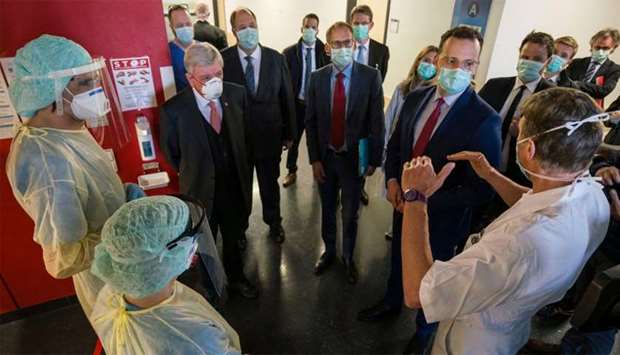Retailers on Tuesday stepped up their push for coronavirus-related restrictions to be eased in Germany so that shops can return to business, while several politicians also called for a gradual reopening of the country's schools.
Germany instituted nationwide restrictions on people's freedom of movement and social contacts three weeks ago to contain the spread of the novel coronavirus, which can lead to the potentially deadly Covid-19 respiratory disease.
By Tuesday morning, more than 126,600 coronavirus infections and at least 2,998 deaths had been recorded in the country, according to a dpa tally based on state data. New infections have slowed but health authorities say the outbreak is still not contained.
The restrictions are currently due to expire on Sunday, which marks the end of the Easter holidays in almost all German states. Chancellor Angela Merkel and state premiers will discuss on Wednesday how to proceed.
‘If downtown shops have to remain closed nationwide for much longer, there is the threat of a huge wave of bankruptcies and thus permanent damage to our vital city centres,’ the head of the German Retail Federation, Stefan Genth, told dpa on Tuesday.
The fashion industry is under particular pressure, said Axel Augustin from the Association of the German Textile Retail Trade, warning that ‘things will get really bad for us’ if business does not resume by the beginning of May.
Schools have also been shuttered due to the coronavirus pandemic. The leaders of the Green Party, Annalena Baerbock and Robert Habeck, were among those calling for them to gradually reopen.
‘Classes in their senior year should return first,’ they wrote in a letter to their members seen by dpa.
Roughly 8.3 million pupils at general education schools have been affected by the school closures, including up to 1.1 million pupils in the final grades, the Federal Statistical Office said on Tuesday. Some 2.4 million pupils at vocational schools are also affected.
‘In the interest of children and their well-being, it would be good for as many of them as possible to soon be able to return to creches, daycare centres and schools,’ Brandenburg state Premier Dietmar Woidke, who also currently serves as president of the Bundesrat upper house of parliament, told the Funke media group.
But many officials on Tuesday advocated for caution in changing the restrictions.
‘We need a safe and level-headed path out of the coronavirus crisis,’ Markus Soeder, the premier of the hard-hit state of Bavaria, wrote on Twitter. ‘Our measures are having an effect, but we cannot risk a setback.’ He argued that a careful easing of restrictions can only take place together with additional protection measures.
‘None of us should be under the illusion that we will get back our old life next week,’ Lower Saxony Premier Stephan Weil said on Tuesday.
‘In the end, it is about finding the right balance between health protection, public life and the economy,’ Health Minister Jens Spahn said, predicting that there will be ‘careful first steps’ into a new normal.
The government agency for disease control and prevention, the Robert Koch Institute, recommended keeping in place strict social distancing and hygiene rules if restrictions are loosened.
‘We should maintain that discipline,’ said its president, Lothar Wieler.

